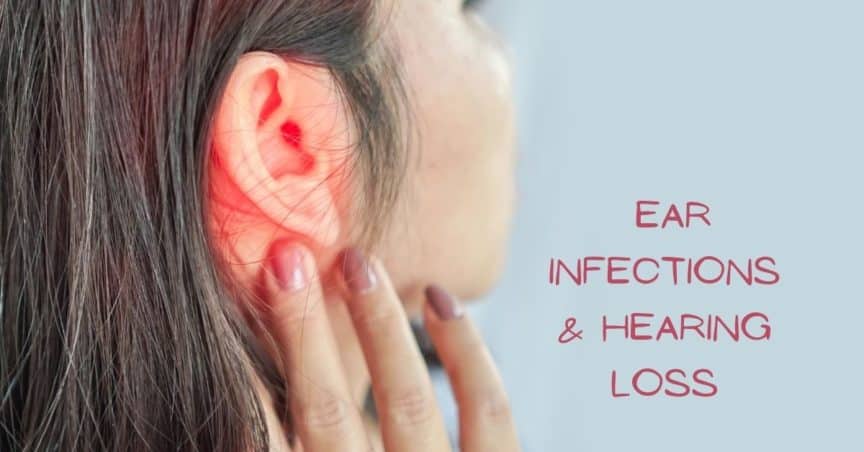Ear infections are a fairly common condition, especially for children. However if ear infections are not treated or become chronic they can cause serious problems with your hearing.
Types of ear infections
Outer ear infections: If you or your children spend a lot of time in the water then you can be at risk for swimmer’s ear. Swimmer’s ear is an infection of the outer ear that occurs when water gets trapped in the outer ear causing irritation, swelling and infection. Swimmer’s ear can clear up on it’s own, restoring hearing or be treated with antibiotics in more extreme cases.
Middle ear infections: Middle ear infections are especially prominent in children as their ear canals are still developing, allowing less space for fluid to drain. Middle ear infections, also called acute otitis media, can cause ear pain and inflammation as fluid builds up in the space usually occupied by air behind the eardrum. When this fluid cannot drain due to infection it can reduce movement of the eardrum and middle ear bones, leading to hearing issues.
Causes of middle ear infections
What starts as a common cold can develop into an upper respiratory infection. This can quickly turn into a middle ear infection as the back of the throat swells up, which blocks the Eustachian tube. The Eustachian tube connects the middle ear to the back of the throat and nasal cavities and when any of these areas become inflamed it can cause a blockage which in turn can cause ear pain, pressure, dizziness and temporary hearing loss.
How to identify middle ear infections
It can be hard to diagnose middle ear infections for children with limited language but can even be difficult for adults. If you know the signs of middle ear infections you can treat them soon and get relief for a very uncomfortable situation. If you notice your child has a fever, is constantly scratching or pulling at their ear, is slow to respond to voices or has a secretion in their ear, these are clues that could mean an ear infection.
It becomes easier to identify middle ear infections when you can communicate. If you or your child has a constant earache, is feeling pressure of the ear, feels dizzy or nauseous and is having trouble keeping up with conversation you may have a middle ear infection on your hands.
Treating middle ear infections
The sooner you treat an ear infection, the faster the pain and inflammation will subside. Antibiotics are used to clear up serious ear infections. Generally doctors will wait two days before prescribing antibiotics to see if the infection will clear up on it’s own. In the meantime, your doctor will most likely prescribe something to deal with the pain. Over-the-counter anti-inflammatory medications like ibuprofen and acetaminophen are usually used to calm the swelling until the infection is cleared up.
Recurrent or chronic ear infections
It can be alarming when you or your child’s ear infection causes hearing loss. The good news is that hearing loss will usually return to normal after the infection is cleared up. If middle ear infections continue to develop over and over it is important to take this seriously. An ear nose and throat doctor, called an otolaryngologist will sometimes recommend surgery when an ear infection will not allow fluid to drain for an extended amount of time. This procedure is reserved for only extreme recurring middle ear infections.
How to prevent middle ear infections
The majority of ear infections develop because of the common cold. This means that whatever you can do to boost your health and protect your immune system, the less chance you have of the common cold turning into a middle ear infection. Encourage your family to eat a balanced diet rich in vitamins and minerals. Encourage good hygiene, hand washing, avoid exposure to secondhand smoke, and make sure to have your family vaccinated for the flu annually. However, sometimes the common cold is unavoidable. It’s important to stay calm and know that the majority of ear infections can be cleared up easily.
Treating Hearing Loss
If you continue to experience hearing loss even after an ear infection has cleared up this may suggest a more serious problem. For comprehensive hearing health services, contact us today! We can test your hearing and help you find the best solutions for your hearing issues.

